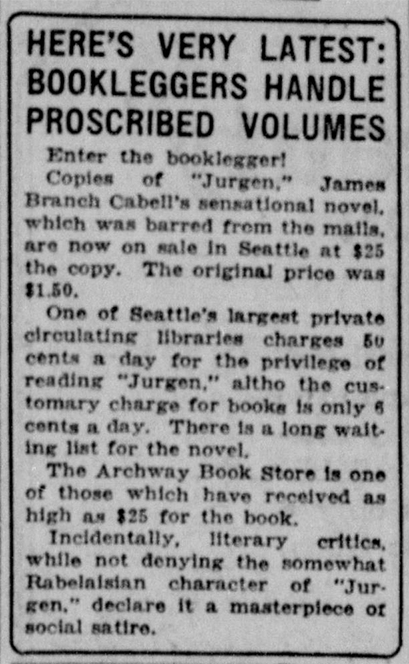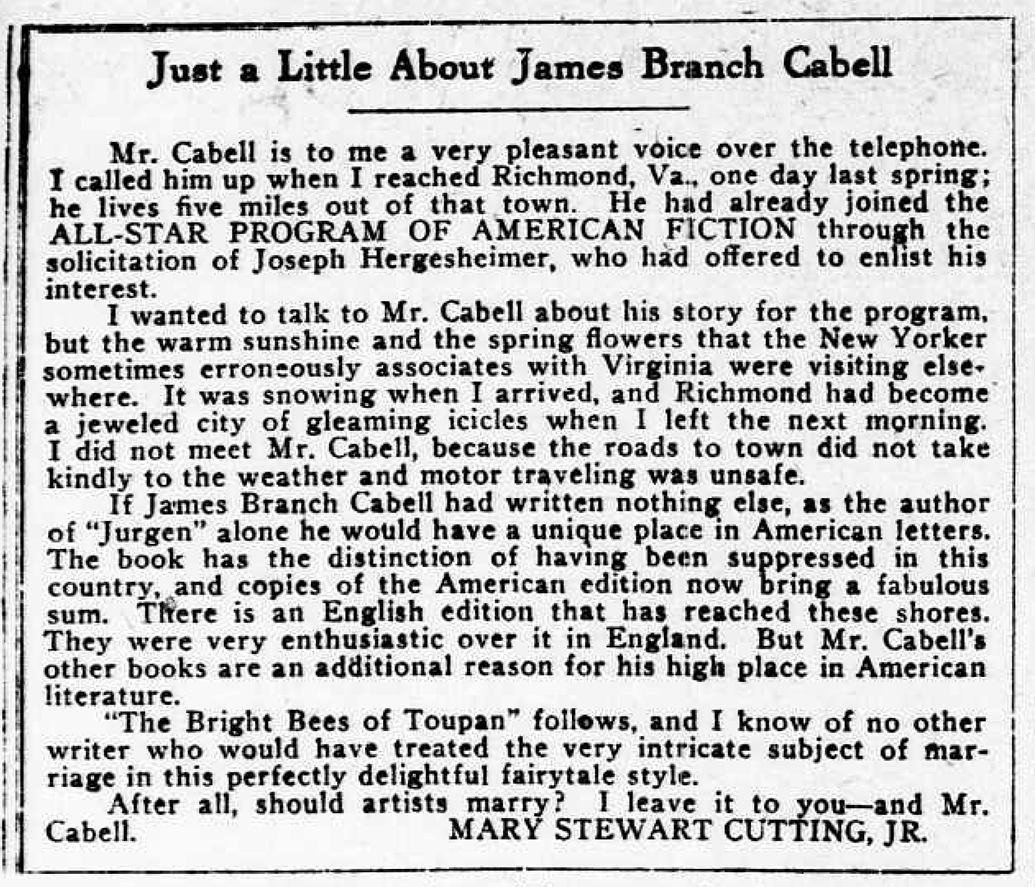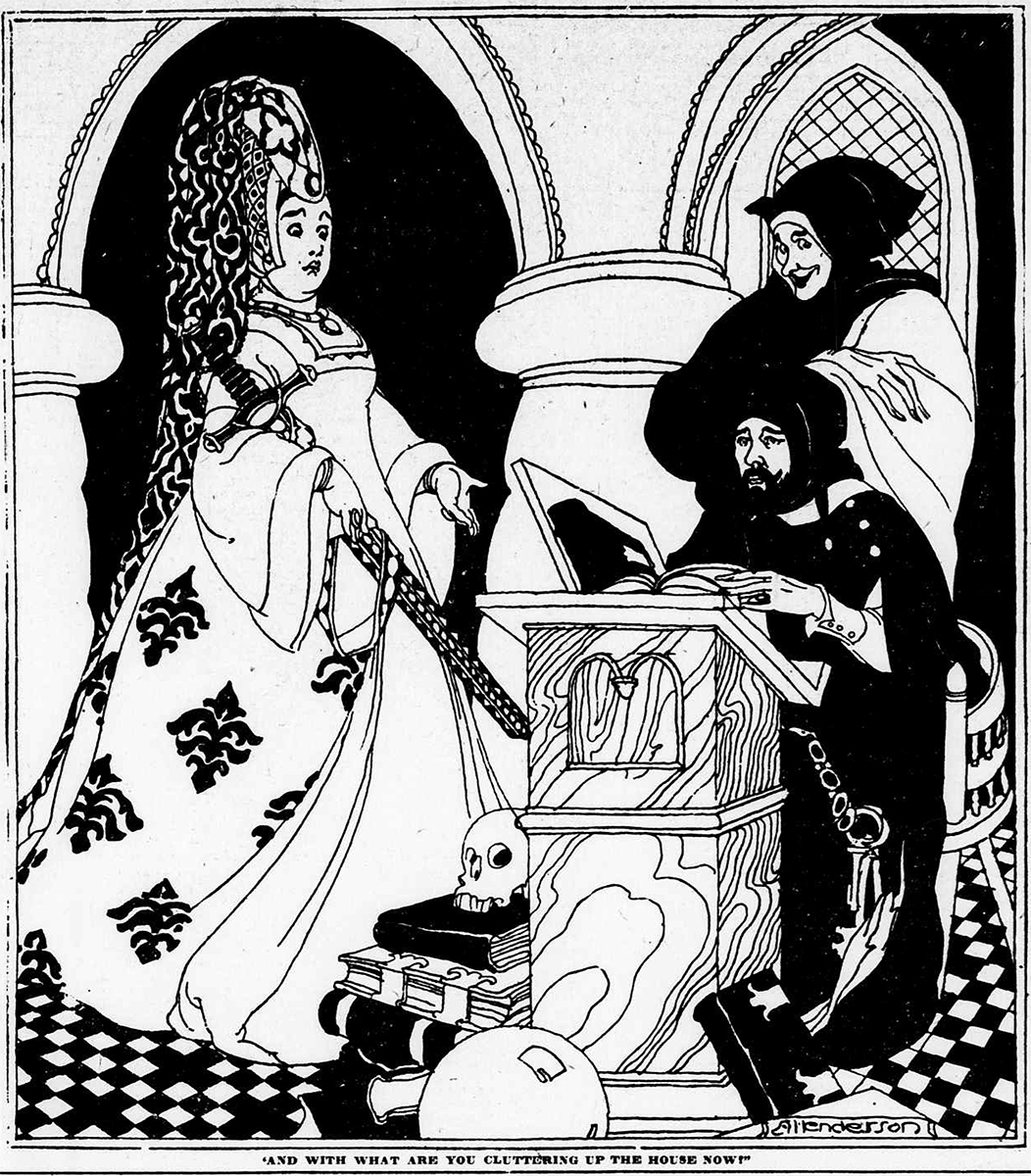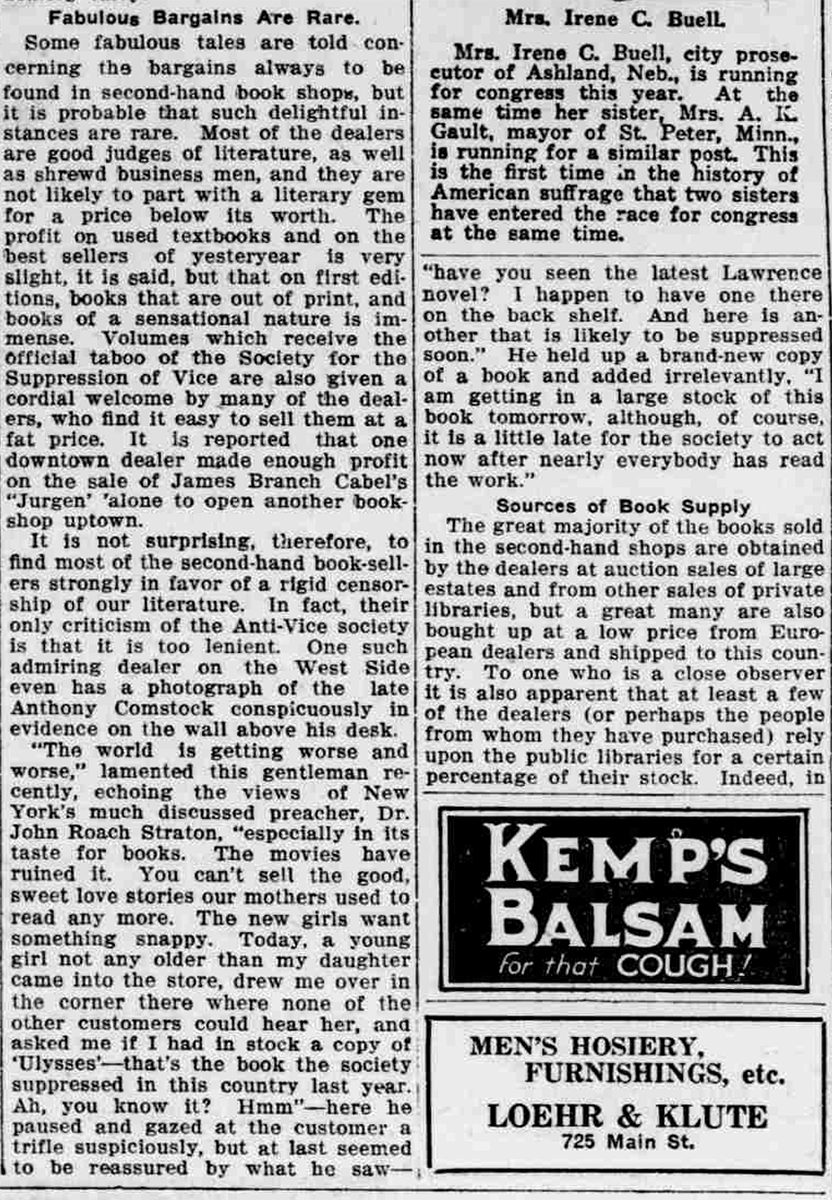The following are transcriptions of newspaper accounts from 1922.

The Seattle Star, July 11, 1922, p. 5
HERE’S THE VERY LATEST: BOOKLEGGERS HANDLE PROSCRIBED VOLUMES
Enter the booklegger!
Copies of “Jurgen,” James Branch Cabell’s sensational novel, which was barred from the mails, are now on sale in Seattle at $25 the copy. The original price was $1.50.
One of Seattle’s largest private circulating libraries charges 50 cents a day for the privilege of reading “Jurgen,” altho the customary charge for books is only 6 cents a day. There is a long waiting list for the novel.
The Archway Book Store is one of those which have received as high as $25 for the book.
Incidentally, literary critics, while not denying the somewhat Rabelaisian character of “Jurgen,” declare it a masterpiece of social satire.

The Washington Times, March 26, 1922, p.3
FORBIDDEN NOVEL FOUND IN LIBRARY
James Brauch [sic] Cabell’s “Jurgen” Accidentally Put in Circulation at College.
CHAMPAIGN, Ill., March 25 — Two illustrated copies of “Jurgen,” James Branch Cabell’s novel, which was barred from the mails shortly after its publication in 1917, have caused considerable excitement recently among co-eds at the University of Illinois. The two volumes were accidentally put into circulation at the university library.
One copy of the book is missing and the university authorities have instituted a search among the students which so far has been fruitless. The other was recovered.
The two books had been ordered from England by Prof. Stuart Pratt Sherman, head of the English department and author of “An Introduction to English Literature,” who characterized “Jurgen” as a “dull and stupid novel.”
The novel was forced out of print in this country because of the nature of its contents and it is not permitted to be sold or distributed through the mails.
When the copies of “Jurgen arrived with a larger consignment of books from England they accidentally became separated from Prof. Sherman’s list and were stamped with the university seal and placed on the shelves in the English reading room.
Two days passed before word leaked out to the head of the English department that “Jurgen” was the talk of campus and could be secured at the library.
Prof. Sherman, when questioned on why he had wished two copies of the novel, explained that he had ordered one of them for a “friend.” The “friend” is still waiting for his copy.

The Evening Star, Washington, D.C, Aug. 6, 1922.
Just a Little About James Branch Cabell (taken from the fourth installment of “The Bright Bees of Toupan” by James Branch Cabell)
Mr. Cabell is to me a very pleasant voice over the telephone. I called him up when I reached Richmond, Va., one day last spring; he lives five miles out of that town. He has already joined the ALL-STAR PROGRAM OF AMERICAN FICTION through the solicitation of Joseph Hergesheimer, who had offered to enlist his interest.
I wanted to talk to Mr. Cabell about his story for the program, but the warm sunshine and the spring flowers that the New Yorker sometimes erroneously associates with Virginia were visiting elsewhere. It was snowing when I arrived, and Richmond had become a jeweled city of gleaming icicles when I left the next morning. I did not meet Mr. Cabell, because the roads to town did not take kindly to the weather and motor traveling was unsafe.
“…copies of the American edition now bring a fabulous sum.”
If James Branch Cabell had written nothing else, as the author of “Jurgen” alone he would have a unique place in American letters. The book has the distinction of having been suppressed in this country, and copies of the American edition now bring a fabulous sum. There is an English edition that has reached these shores. They were very enthusiastic over it in England. But Mr. Cabell’s other books are an additional reason for his high place in American literature.
“The Bright Beens of Toupan” follows, and I know of no other writer who would have treated the very intricate subject of marriage in this perfectly delightful fairytale style.
After all, should artists marry? I leave it to you—and Mr. Cabell.
MARY STEWART CUTTING, JR.

Illustration for “The Bright Bees of Toupan” by James Branch Cabell
The Evening Star, Washington, D.C., August 6, 1922

Richmond Palladium and Sun-Telegram, Richmond, Ind., March 6, 1922, p.2
The Richmond Palladium and Sun-Telegram, Richmond, Indiana, March 6, 1922, p. 2 (excerpt)
Second-Hand Book Marts by Frederick J. Haskin
New York City, March 6…
Fabulous Bargains Are Rare.
The profit on used textbooks and on the best sellers of yesteryear is very slight, it is said, but that on first editions, books that are out of print, and books of a sensational nature is immense. Volumes which receive the official taboo of the Society for the Suppression of Vice are also given a cordial welcome by many of the sellers, who find it easy to sell them at a fat price. It is reported that one downtown dealer made enough profit from the sale of James Branch Cabel’s [sic] “Jurgen” alone to open another bookshop uptown.
“one downtown dealer made enough profit from the sale of James Branch Cabel’s [sic] ‘Jurgen’ alone to open another bookshop uptown.”
It is not surprising, therefore, to find most of the second-hand book-sellers strongly in favor of a rigid censorship of our literature. In fact, their only criticism of the Anti-Vice society is that it is too lenient. One such admiring dealer on the West Side even has a photograph of the late Anthony Comstock conspicuously in evidence on the wall above his desk.
“The world is getting worse and worse,” lamented this gentleman recently, echoing the views of New York’s much discussed preacher Dr. John Roach Straton, “especially in its taste for books. The movies have ruined it. You can’t sell the good, sweet love stories our mothers used to read any more. The new girls want something snappy. Today, a young girl not much older than my daughter came into the store, drew me over in the corner there where none of the other customers could hear her, and asked me if I had in stock a copy of ‘Ulysses’–that’s the book the society suppressed in this country last year. Ah, you know it? Hmm”–here he paused and gazed at the customer a trifle suspiciously, but at last seemed to be reassured by what he saw…
Jurgen and the New York Society for the Suppression of Vice
The Judging of Jurgen by James Branch Cabell (1920)
PREVIOUS: Jurgen In Letters